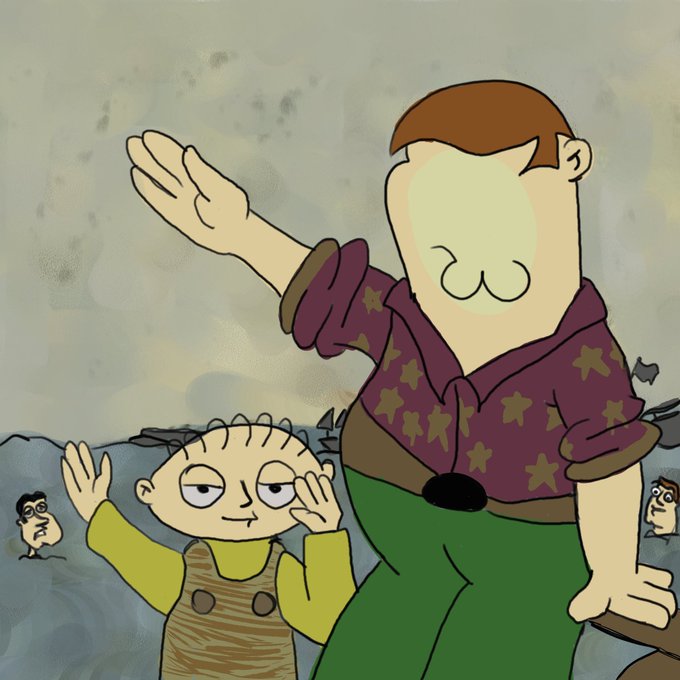The University of California at Berkeley had it's School of Criminology defunded by Ronald Reagan because there were too many Marxists in it. In modern parlance, Marxist criminologists are referred to as "Radical Criminologists". Some concepts that were put forth by these radical criminologists are as follows:
- Capitalism shapes social institutions, social identities, and social action. The mode of production comprising the means of production and the relations of production, facilitated by the ideology promulgated through social institutions, shapes the character of the institutions through which it operates; it encourages divisions of class, race, and gender and shapes identities and the activities of the individuals subject to it (Michalowski 1985).
- Capitalism creates class conflict and contradictions. Capitalist society forces humans into class conflict based on the inequalities of ownership and control of the means of production (Spitzer 1975; Quinney 1977). These classes are divided because the capitalist owners and employers want to maintain the existing power relations or improve them in their favor by increasing profits, whereas workers want to change the system and increase their share of the fruits of production by increasing wages. These desires produce two fundamental contradictions. The wages, profits, and consumption contradiction requires workers to have sufficient income to make consumption purchases and thereby increase economic growth. Too much growth, however, is undesirable, as profits and investment possibilities are undermined. The wages–labor supply contradiction requires that a surplus population of unemployed workers be maintained to keep labor costs down, but these people are not so impoverished that they create problems and costs for capitalism (Chambliss 1988).
- Crime is a response to capitalism and its contradictions. Crime is a rational response to the objective conditions of one’s social class (Chambliss 1975, 1988). Capitalism creates crime directly through generating and maintaining a surplus labor force of the unemployed and underemployed, or “underclass” (resulting from technological replacement), who are necessary for keeping wages low, but who also may commit crimes to survive (Spitzer 1975; Chambliss 1988). Capitalism creates problems indirectly through education, necessary for managing increased technology and for learning how to labor, but with the unintended consequence of raising consciousness (Spitzer 1975). Predatory crimes of theft, robbery, and burglary and personal crimes such as murder, assault, and rape are the result of the oppressive conditions of capitalism to which those exploited have to accommodate. Crimes such as sabotage and political violence are the result of resistance to and even rebellion against capitalist domination. Crimes of both accommodation and resistance may be more or less politically conscious acts (Quinney 1977; Michalowski 1985; I. Taylor, Walton, and Young 1973). Crimes among the dominant economic classes also result from capitalists’ attempting to resolve the contradiction of wages, profits, and consumption by cheating to get illegally what they cannot get legally in ways that harm other capitalists (Chambliss 1988).
- Capitalist law facilitates and conceals crimes of domination and repression. Capitalist law as part of its methods of domination inflicts harms on those subject to control, including violence and violations of human rights. As well as such “crimes of control,” capitalism facilitates “crimes of government,” including corruption and graft; “crimes of economic domination” such as corporate fraud, price-fixing, dangerous production methods and products, and toxic pollution, which are undertaken in response to its basic contradictions; and social harm or injury to human rights resulting from institutionalized racism and sexism, which are reflective of the hierarchy of domination in the capitalist system as a whole (Quinney 1977).
- Crime is functional to capitalism. Crime provides work for the surplus population and for others in the crime-control industry, mystifies the capitalist exploitation of workers (Chambliss 1975), and justifies the need for the very law that maintains that system of exploitation ( J. Young 1981).
- Capitalism shapes society’s response to crime by shaping law. The ruling economic class defines the content of criminal law in order to control the subordinated classes, which threaten or create problems for capitalism’s accumulation of wealth and its system of domination (Chambliss 1975; Spitzer 1975; Quinney 1977). These problems include threats to the capitalist system of ownership of the products of work (e.g., theft), threats to the production process (e.g., unemployment, vagrancy, drug use, mental illness), threats to the system of distribution and consumption (e.g., substance abuse, theft), threats to the system of reproduction of workers (e.g., truancy, homosexuality), and threats to the institutions promoting the dominant ideology (e.g., alternative schools, cooperatives). For the purpose of management, these threats fall into one of two problem populations: the relatively harmless “social junk,” which has to be carried by the system, and the relatively dangerous “social dynamite,” which must be controlled and undermined. (Spitzer 1975)
Marxist criminologists are split into two camps: Instrumental and Structural. Instrumental marxists see "a direct and crude relationship between the ruling economic classes and the government" and "the law and criminal justice system are coercive instruments used to control the lower classes. This control serves to maintain the existing social, political, and economic system. Members of the dominant capitalist ruling class make laws and devise a criminal justice system that promotes their own economic interest.", while Structural marxists see a "much more autonomous role for government, which acts on behalf of the long-term interests of capitalism rather than in the short-term interests of powerful corporations".
I'll be banging this drum till I die, but it's the exact same thing with the criminalization of homelessness. The meme about California libs turning into Hitler when confronted with homeless people and the consequences of capitalism comes from the same place as paranoid cable watchers who lick boots because of "gang violence"!
The same difficulties hold true for organizing amongst the most alienated, on-the-fringes, chronically unhoused communities. God knows how you can manage to help people without homes or food into revolutionaries, but patient dedication to a better world is the only way to make it .
The lumpenproletariat i believe is one of the hardest groups to radicalize, but if the reserve army of labor could be reduced, it would accelerate the downfall of capitalism. Classmates of mine have suggested that a major issue with radicalizing the lumpen is what is called "sub-cultural issues" in social disorganization theory - this mostly refers to criminal gangs, which often encourage "delinquent behavior" and move focus away from class and other forms of solidarity. A major obstacle for socialists is overcoming things like gangs - the last person to do this ended up getting assassinated by the CPD.
Because what helps people be integrated into society like a criminal record
Crime and Capitalism
Hate it. Next question.
Fr though this is a great post. Point 5 in particular is something I try to impress upon libs a lot — I know Boots Riley had a great thread about it around a year ago that broke it down pretty well, how capitalism not only requires crime but creates it. (archive link)
The group of professionals, police, and professors that are dedicated to criminal justice are merely one part of this as well. Capitalism requires a reserve army of labor, which simultaneously is prone to becoming criminal as it is forced to subsist on low wage, while also enduring poverty, disease, and other cultural issues. Also, other marxists theorize that capitalism necessitates egoism rather than altruism, and that egoism favors criminal thought and fracturing of community, which subsequently reduces the capacity to curb "destructive thought".
The University of California at Berkeley had it’s School of Criminology defunded by Ronald Reagan because there were too many Marxists in it
Communism no freedom, America freedom
Best post I've seen on here in a while. !effort@hexbear.net is another comm for this type of content.
Predatory crimes of theft, robbery, and burglary and personal crimes such as murder, assault, and rape are the result of the oppressive conditions of capitalism to which those exploited have to accommodate.
I like the distinction between "predatory crimes" and "personal crimes." It's useful to separate crimes that usually have a clear economic motive from crimes that usually have some non-economic motive. That difference in motive informs how those crimes might be deterred, how people who commit those crimes should be treated, the feasibility of restitution, etc. It seems reductive, though, to suggest that every crime in both categories is a product of capitalism (that's at least how the excerpt reads, and how a lot of leftists talk about crime). People commit plenty of personal crimes in circumstances with only a distant connection to capitalist oppression -- look at Rand Paul's rich neighbor beating him up over something silly like lawn maintenance, for instance. Look at young people (plenty of whom are wealthy and far from the sharp edge of capitalism) who get drunk and get into bar fights (or who do other "thoughtless kid stuff," like rebellious acts of vandalism or theft). The causes of that are the inhibition-lowering effects of alcohol and the poor judgment of young people, first and foremost, and I think you'd see some of that in any society with alcohol and young people. Tweaking the message only slightly from "crime is the result of capitalism" to "a significant majority of crime is the result of capitalism" is probably more correct, and as such will land with more people and defuse some pushback.
The other topic that should be part of any leftist conversation about crime is how we should handle crime that's happening right now. Think of a person who lives in a high-crime neighborhood -- not a suburbanite with irrational fears of carjackers or home invasions in their wealthy gated community, but a person who has personal experience with crime and legitimate concerns about their safety. That person might get on board with the left's long-term solutions to crime, but they also (understandably) want a solution that will help them right now. What's the answer for them?
a lot of street crime that isn't necessary caused by capitalism is covered by social disorganization theory, which in theorizes that crimes like vandalism, theft, burglary, brawling, etc. are caused by a lack of strong social relations in a given neighborhood. It is believed that high rates of ethnic diversity, neighborhood instability, and familial instability, as these all contribute to a neighborhood having weak social relations and networks.
where this doesn't apply, you could look to deviancy theory of crime, which can be applied to many sorts of crime.
Any recommendations for a primer on these theories? I remember looking for some academic reading on criminology a while back and having trouble finding a place to start.
I'm a fan of Classics of Criminology. Here's a PDF, this is frequently used in graduate-level criminology theory courses.
This is a great post so I had to save it elsewhere. Hope ya don’t mind. https://archive.ph/1YKEd https://archive.ph/ikQhR
I ... Agree with basically all of this. Illegalism is the only ethical position, trust nobody who won't crime.



